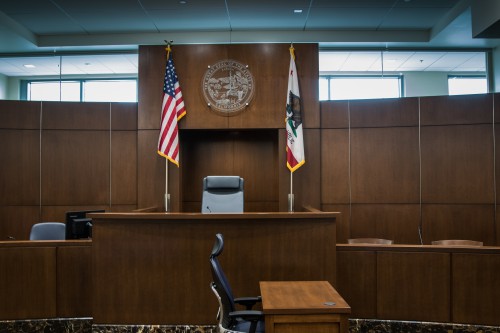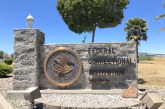 This week, after seven days of deliberation, a jury found Alamar Cyril Houston not guilty of attempted murder, but they found him guilty of 11 felony and two misdemeanor charges, which included striking and critically injuring three bicyclists near Clarksburg last year.
This week, after seven days of deliberation, a jury found Alamar Cyril Houston not guilty of attempted murder, but they found him guilty of 11 felony and two misdemeanor charges, which included striking and critically injuring three bicyclists near Clarksburg last year.
On Thursday, the trial entered its second phase – the sanity phase. However, after the lunch break, the defendant told Judge Rosenberg that he was withdrawing his plea of not guilty by reason of insanity.
The jury, while they rejected attempted murder, convicted him of assault with a deadly weapon and hit and run with injury for striking the cyclists. Two of the cyclists were hospitalized and one spent two weeks in a coma with a traumatic brain injury.
The jurors also convicted the 40-year-old of vehicle theft and evading or resisting police.
Alamar Houston Case Enters Phase Two of the Trial
By Gloria Ho
On the morning of December 1, 2016, the trial of the People v. Alamar Cyril Houston entered phase two with Judge David Rosenberg presiding in Department 14 of Yolo County Superior Court. Mr. Houston was charged with attempted murder, assault with a deadly weapon, hit-and-run and driving under the influence of a controlled substance, vehicle theft, evading or resisting police, and two more assault charges – from Colusa to the airport to downtown Sacramento to West Sacramento to Clarksburg, on June 30, 2015. Mr. Houston was pleading not guilty by reason of insanity due to his untreated mental illness. The jury acquitted him on the attempted murder count and of being under the influence of methamphetamine during the crime spree, but found him guilty of 11 felonies and two misdemeanors.
“A verdict of not guilty by reason of insanity will need a unanimous jury,” said Judge Rosenberg. The burden of proof is on the defense in the sanity phase, to prove that Houston suffered from mental disease or defect.
Deputy Public Defender Dean Johansson then stated that the first person on the defense’s witness list for the second phase of the trial was Dr. Captane Thomson, a Davis psychiatrist, to serve as an expert witness in psychiatry and clinical psychiatry.
The Department 14 jury then entered the courtroom. After they were seated, the judge instructed the jury, “Burden of proof is no longer on prosecution. Burden is on preponderance of evidence, not beyond reasonable doubt.”
Dr. Thomson then took the witness stand and was questioned by the defense about his credentials and work experience with psychiatry. He was appointed by court since 1967 to testify as an expert witness in psychiatry. Dr. Thomson is a licensed physician and surgeon who specializes in psychiatry and is still practicing in Davis, California. The expert witness is also board-certified in psychiatry and forensic psychiatry. He is currently teaching third-year medical students at UC Davis, School of Medicine. The court accepted Dr. Thomson as an expert witness in psychiatry and clinical psychiatry.
The defense’s witness testified that Mr. Houston did not speak of his alleged offenses nor did he mention injuring three bicyclists. Dr. Thomson read from his notes that Mr. Houston did not remember what occurred, but only that he heard voices chattering in his head, that he saw one news report saying he hit three robots, and then wondered if he had a brain implant.
Dr. Thomson may or may not recall the meetings on July 30, 2015, and December 2, 2015, in detail since he was mostly referring to and relying on the DSM (Diagnostic and Statistical Manual of Mental Disorders) book, jail reports from a forensic psychiatrist named Dr. Jennifer Chaffin, his notes of his meetings with Mr. Houston, and other documents to answer questions.
The defense then asked Dr. Thomson if he could determine whether the defendant has a mental disease history. Dr. Thomson said he could, and that he saw from the reports of Dr. Chaffin that Mr. Houston was treated with three anti-psychotic drugs over two-week intervals, six weeks total, in the Yolo County Jail from July 1, 2014, to October 27, 2014. Dr. Chaffin never called the defendant schizophrenic after assessing him for four months in 2014, but in 2015, when she reassessed him again for approximately five weeks, she diagnosed him with psychosis and Dr. Thomson said that it is possible that the psychosis was drug-induced.
Dr. Thomson also testified that a phone review with Mr. Houston’s mother showed that the defendant has a mental disease history and stated that, according to his mother, Mr. Houston’s maternal grandfather has a diagnosis of schizophrenia. From here, Dr. Thomson noted his observations of Mr. Houston’s anxious behavior, his rapid, pressured talking that was hard to follow, his disorganized thinking, and his concepts and ideas that were clearly unusual.
Dr. Thomson then read from the DSM and listed the domains of schizophrenia while tying them to what he observed from Mr. Houston. Dr. Thomson read from his notes, “[Mr. Houston] has delusion – brain implants, hallucination – hearing voices, behavior – highly abnormal, does not have negative symptoms since usually long-term schizophrenics have them, and does not have disorganized speech.”
The People cross-examined the witness by asking how many sanity evaluations he’s done and when, in this case, he was hired to do a sanity evaluation. Dr. Thomson disclosed that he does one sanity evaluation a year.
Deputy DA Garrett Hamilton made the observation that the court did not appoint Dr. Thomson. The witness revealed that he was asked to consult with Mr. Johansson about whether the defendant might qualify for an insanity plea. The defense’s witness explained that he was asked to evaluate the defendant for sanity on November 11, 2016, but he was not asked to write an official report evaluating the merits of an insanity plea.
Mr. Hamilton asked Dr. Thomson if he relied on what Mr. Houston’s mother had said about her father being diagnosed with schizophrenia to reach his opinion, and he agreed that he did give some weight to that. Additionally, Dr. Thomson said he relied on the two conversations with Mr. Houston in 2015 as well.
When Dr. Thomson was asked if he was aware of the evaluation by Dr. Jason Roof, a UCD forensic psychiatrist, on malingering (feigning illness) and antisocial records, he said he did not know about those records. Further, he was not made aware of all of Dr. Roof’s and Sacramento psychiatrist Dr. Stancil Johnson’s testimonies to the jury about Mr. Houston. Dr. Thomson revealed that he was not provided Dr. Johnson’s testimony of malingering.
The People asked if Dr. Thomson had no reason to believe that Mr. Houston was faking mental illness, and Dr. Thomson said that was correct. When asked if he respected Dr. Roof, Dr. Thomson said that he did, and he added that Dr. Roof was well respected in psychiatry. Mr. Hamilton followed up, questioning Dr. Thomson about whether a different opinion could change his mind about Houston not faking a mental illness, and Dr. Thomson said that was possible. Dr. Thomson also explained that he never ran malingering tests on Mr. Houston because the defendant did not tolerate any interviews longer than 15-20 minutes.
Furthermore, Mr. Hamilton read a part of the report by Dr. Jean Dansereau, a San Luis Obispo psychiatrist, from September 2005 that said, “The entire team including myself believes that Mr. Houston’s psychosis is not credible… There is no report of psychosis and he used it to manipulate the system.” When asked if reading this report prior to coming in to testify would change his perspective, Dr. Thomson said he would consider it very seriously. However, when asked by the defense if anything Mr. Hamilton said had changed his testimony, Dr. Thomson said no.
The People asked to clarify for the jury: “Did you testify that you did not have the opportunity to re-evaluate him?”
Dr. Thomson responded, “Yes.”
The People questioned, “Would you, if you had the opportunity?”
Dr. Thomson answered, “Yes. I’d be on my way to (the) jail.”




